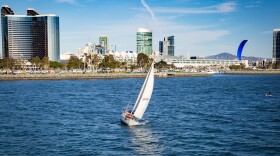Political stability is the bedrock of a healthy economy. The United States is inarguably struggling with both. Daniel Enemark, chief economist at the San Diego Regional Policy & Innovation Center, spoke with KPBS about the economic forecast for San Diego and the country.
How would you characterize the state of the U.S. economy right now and the San Diego economy?
Enemark: The state of the U.S. economy is weakening. It’s actually been weakening for longer than we realized. The latest big revision, which is a typical process with the Bureau of Labor Statistics, showed about 900,000 fewer jobs than we thought existed starting in April 2024. So this is not just the Trump economy; this is also the Biden economy. We simply haven’t had as many new jobs created as expected. We were starting from a weaker position than we realized, and it’s getting worse month by month, unfortunately.
And how is that filtering down to San Diego?
Enemark: A lot of the factors driving national economic problems hit San Diego especially hard. Take trade policy and high tariffs. In San Diego, trade isn’t just one country selling finished goods to another; it’s co-production. The regional EDC estimates that a typical medical device component might cross the U.S.–Mexico border six or eight times during production.
When we’re so intertwined with Mexico in our supply chain, tariffs can really disrupt things. A region like ours, engaged in as much cross-border trade as we are, is more vulnerable than average. Another challenge is artificial intelligence, which is beginning to undermine some entry-level jobs, particularly in the innovation sector, a major driver of San Diego’s economy.
What worries you most about where we might be headed?
Enemark: I’m concerned about job losses. The biggest impact of a downturn isn’t just that people lose jobs; it’s that when they do, it becomes much harder to find new ones. People spend more time unemployed. Combine that with our very high cost of living, and that’s a dangerous mix.
My greatest fear is that San Diego becomes Santa Barbara, a place that’s beautiful but only the wealthy can afford to live.
How much of what we’re experiencing right now is just the natural ups and downs of the economy, and how much is self-inflicted?
Enemark: We had a really strong job market before COVID, then saw the sharpest and fastest increase in unemployment in history. After that, we bounced back to a very strong labor market, but we’ve been sliding again. That’s probably part of the normal business cycle.
It certainly predates Trump’s policies, which many economists might say were self-inflicted wounds in terms of tariffs and deficit spending. But the decline in the labor market started before that. So, most economists would say this is largely cyclical. If you’re more conservative, you might say “Bidenomics” is to blame. Honestly, assigning cause and effect is really difficult.
What needs to happen to turn this around?
Enemark: We need stability above all else. When the economic environment is unstable, people and businesses spend less. Employers hesitate to hire. Families delay buying cars or homes because they don’t know what the future holds. It’s dangerous to invest in the present when the future feels uncertain.
So if we’re going to implement tariffs, at least do it all at once and make it clear they’ll be in place for the long term. Factories are built over five years; no one’s going to build one here if they think policies might change next month.
We also need to stop harassing workers at their workplaces, particularly immigrants who are subject to raids. After immigration raids began in California, we saw fewer people showing up to work because they feared deportation. That’s a serious drag on the economy.
Finally, here in San Diego, we must invest in housing. We can’t have a functioning economy if only the ultra-rich can afford to live here. We need housing for professionals and service workers alike.
Do you see any signs that any of this is going to happen? I recently spoke with San Diegans who said the political and economic uncertainty has them delaying big life decisions like having kids, buying homes, and retiring. What does that say to you?
Enemark: Locally, I actually see some encouraging efforts. City and county officials are working hard to spur the housing construction we need. The county is thinking carefully about how to use its rainy-day fund and how to handle the drop-off in federal services that’s likely under the “one big, beautiful bill.”
I’m encouraged by what’s happening locally and discouraged by what’s happening federally. Shutting down the federal government is not helpful.






